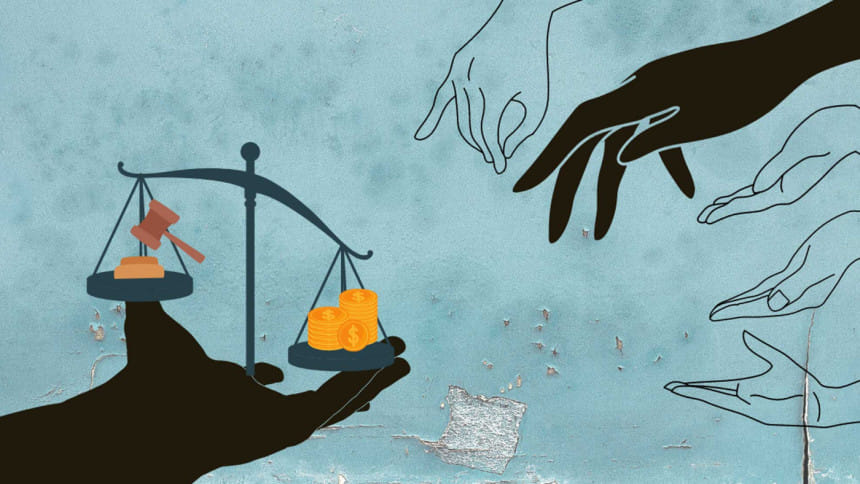National Legal Aid Day: Three ways to improve our national legal aid system

Today marks the National Legal Aid Day, which was introduced by the government in January 2013, in an effort to increase public awareness of national legal aid services. As foreign funding for NGO legal aid shrinks with Bangladesh emerging as a middle-income country, the time to mainstream, strengthen and expand governmental legal aid has never been more urgent. Yet, 22 years after a national legal aid system was mandated, public awareness about it remains less than adequate.
On January 26, 2000, Bangladesh introduced the Legal Aid Services Act 2000 (LASA), a law "to provide for legal aid to the litigants who are incapable of seeking justice due to financial insolvency, destitution, helplessness and for various socio-economic conditions." Section 3 of LASA mandated the establishment of the National Legal Aid Services Organisation (NLASO) to carry out the purposes of LASA, "as soon as may be after the commencement" of the law. However, it was only in 2009 that the NLASO was finally established.
Section 6 of LASA requires a National Board of Management to lead NLASO, comprising relevant high-ranking government officials such as the Law Minister, Attorney General and Vice-Chairman of the Bangladesh Bar Council, etc. Section 9 of LASA requires District Legal Aid Committees to be established in every district, comprising relevant district level government officials such as the District and Sessions Judge (who is to be the chair), District Public Prosecutor, and President of the District Bar Association, etc. The Committee must also have one representative from a relevant NGO active in the area.
So far, a District Legal Aid Office has been established in the District Judge Court premises of all districts, along with a corresponding District Legal Aid Committee. The government has also appointed a District Legal Aid Officer, who is an Assistant Judge or Senior Assistant Judge, and the list of all District Legal Aid Officers, along with their contact details, is available on the NLASO website. The government has also been establishing legal aid committees at the upazila and union levels, but these are often criticised as being inactive in practice. The website, for instance, has no information or contact information for upazila and union legal aid committees, as it does for the district ones.
According to LASA, all applications for legal aid must be submitted to the concerned District Legal Aid Committee and if any application is rejected by the District Committee, the applicant may appeal to the National Board within 60 days from the date of such rejection. Recently, NLASO has also introduced an online application system, which legal aid seekers can use to virtually submit their legal aid applications to their nearest district legal aid offices.
The Legal Aid Service Policy 2014 was formulated to clearly set out the eligibility criteria for legal aid. Section 2(1) of the Policy clarifies that legal aid recipients would typically need to have an annual income of less than Tk 1 lakh, but in the case of freedom fighters and applications for legal aid at the Supreme Court, the income needs to be less than Tk 1.5 lakh. However, Section 2(2) of the Policy establishes that certain vulnerable individuals would be deemed eligible for legal aid (without reference to their income status) such as victims of human trafficking and women and children who have faced physical or sexual violence and persons with disabilities, etc.
The legal aid services provided by NLASO can be categorised in three main forms. First, it provides legal advice to individuals, and since 2016 it has been operating a toll-free legal aid helpline (16430) through which anyone can receive free legal advice. Second, it provides alternative dispute resolution by mediating civil disputes and disputes relating to petty crimes (i.e. compoundable offences) between parties. Third, it provides court based legal assistance and representation through its panel lawyers, for cases where mediation has not been successful or where mediation is not an option (i.e. grievous offences which are non-compoundable, such as rape and murder, etc). According to a factsheet published by NLASO in March 2022, its legal services have reached over 736,000 beneficiaries since 2009.
Despite the commendable progress made by NLASO in the past 13 years, some crucial gaps remain. First, the Legal Aid Services Regulation 2015, which sets out the process and rules of the national legal system, does not require legal aid recipients to be reimbursed for case related travel expenses. Commuting to court and legal aid offices can often amount to a hefty cost that precludes justice seekers from continuing with their cases due to the frequency of travel involved. Therefore, reimbursement of conveyance has been a fixture of NGO legal aid in Bangladesh, and should also be incorporated by NLASO by updating its 2015 Regulation. Second, in order to reach the most vulnerable and remote populations, upazila and union legal aid committees need to be activated through appointment of dedicated legal aid officers and expansion of the online application system to the upazila and union levels, so that the decision to seek legal aid does not always require the need to travel to far off, district level cities. Third, NLASO should introduce an online dispute resolution mechanism so parties are able to participate in mediations remotely in a cost-effective manner, as had been implemented by various legal aid NGOs (such as Brac and BLAST) during the Covid-induced lockdown period through the use of tele-conferencing.
Taqbir Huda is the Advocacy Lead of GJD, Brac. Email: [email protected]

 For all latest news, follow The Daily Star's Google News channel.
For all latest news, follow The Daily Star's Google News channel. 



Comments